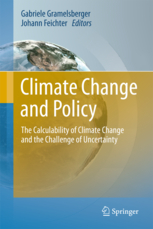FU Institute of Philosophy
Home
Research
Publications
Workshops
Teaching
Talks
Contact/Editorial

The uncertainty of predictability of climate effects is still a contentious issue in science and society. On the one hand decision-makers require certainty about future consequences of today's behaviour. On the other hand the complexity of the climate system, of human behaviour and global interactions defeats the desire for certainty. Although it has turned out that the world isn't predictable in a Laplaceian manner, advanced strategies of calculability have been developed to measuring and dealing with uncertainty. The contributions in this book give a first hand insight into climatologists' strategies in dealing with uncertainty by using simulation models and into social, political and economical requirements in future prognoses on climate change. Do these strategies and requirements meet each other or fail?
2011, April, 240 pp., approx. 106,95 €
ISBN 978-3-89942-986-2
Springer Heidelberg
Series Earth Science and Geography
»Springer information (external link, german)
»Interview on Telepolis (external link, german)
Content table
Johann Feichter, Gabriele Gramelsberger
1 Introduction to the Volume - 1
Gabriele Gramelsberger, Johann Feichter
2 Modelling the Climate System - An Overview - 9
2.1 Understanding of the Climate System
2.2 The Need for Numerical Models in Science
2.3 Calculating the Climate System
2.4 International Coordination of Climate Modelling
2.5 Climate Projection and the Challenge of Uncertainty
2.6 Scientific arguments for socio-political decisions
2.7 References
Arthur C. Petersen
3 Climate Simulation, Uncertainty, and Policy Advice - The Case of the IPCC - 91
3.1 Introduction
3.2 The IPCC as a boundary organization between science and politics
3.3 The IPCC review process
3.4 Sceptical criticism of the IPCC review process
3.5 Negotiating the wording of the summary for policymakers
3.6 Conclusion
3.7 References
Hermann Held
4 Dealing with Uncertainty - From climate research to integrated assessment of policy options - 113
4.1 Introduction
4.2 Uncertainty in GMT projections
4.3 Estimating the proximity to thresholds
4.4 Extracting response time scales
4.5 Climate projection statistics as a philosophical battlefield
4.6 Deriving sustainable solutions under uncertainty
4.7 References
Alex Vasa, Axel Michaelowa
5 Uncertainty in Climate Policy - Impacts on Market Mechanisms - 127
5.1 Introduction
5.2 Uncertainty in International Climate Policy
5.3 The state of the carbon market and the influence of real and perceived uncertainties on prices of carbon
5.4 Interaction of key actors in the Kyoto/CDM market and their influence and challenges with uncertainty
5.5 Conclusion and final remarks
5.6 References
Michael Huber
6 Insuring climate change - Managing political and economic uncertainties in flood management - 145
6.1 Introduction
6.2 The insurability of natural hazards
6.3 The varying insurability of floods
6.4 Risk
6.5 Analysis and Concluding Remarks
6.6 References
William R. Cotton
7 Climate Science, Weather and Climate Engineering, and Scientific Objectivity - 159
7.1 Introduction
7.2 The science of weather modification
7.3 Climate variability
7.4 Climate engineering and politics
7.5 The science vs. politics conflict
7.6 References
Livia Bizikova, Sarah Burch, John Robinson, Alison Shaw, Stephen Sheppard
8 Utilizing participatory scenario-based approaches to design proactive responses to climate change in the face of uncertainties - 171
8.1 Introduction
8.2 Key characteristics and approaches for dealing with climate change uncertainty
8.3 British Columbia Case Studies
8.4 Opportunities for designing responses to climate change despiteuncertainties
8.5 References
Birgit Schneider
9 Image Politics - Picturing uncertainty. The role of images in climatology and climate
policy - 191
9.1 What is expected of informational images
9.2 The status of scientific images
9.3 An abnormal truth
9.4 The red blade of a hockey stick
9.5 Collages of time and space: picturing possible futures
9.6 Conclusions: The role of pictures of climate change
9.7 References
About the Authors - 211
Glossary and Abbreviations - 217
Index - 237
